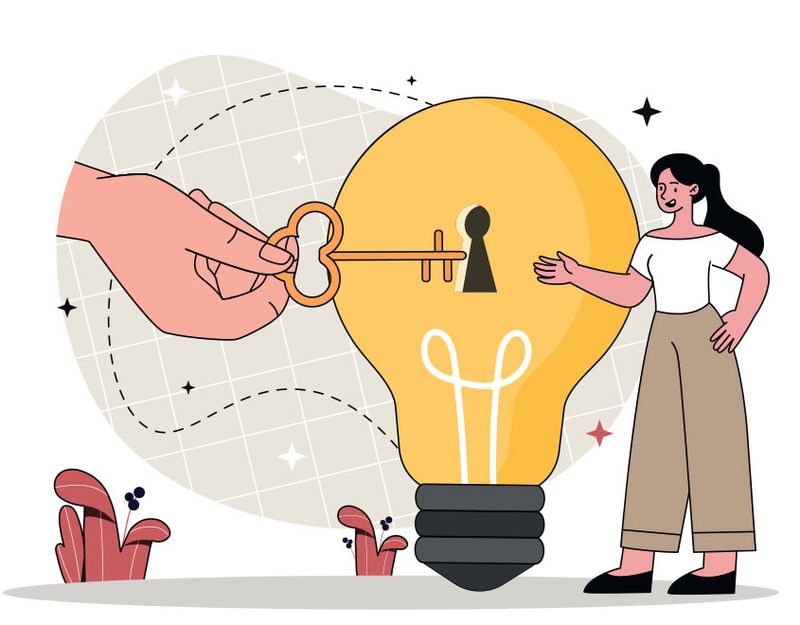16 Habits Of Intelligent People That Can Send The Wrong Signal
Intelligent people often exhibit behaviors that can be misunderstood by others. While these habits might be second nature to them, they can sometimes send unintended signals. Here, we explore 16 such habits, shedding light on how they might be perceived and the reasons behind them.
1. Overexplaining things that feel simple

Ever been caught in a web of over-explanation? Many intelligent folks have. They tend to dissect the simplest of ideas to ensure clarity, but this habit leaves some listeners baffled. Imagine diving deep into the nuances of tying shoelaces. It’s the classic case of a well-intentioned explanation gone awry. Each thread unravels unnecessarily, potentially leading to glazed-over eyes and minds wandering.
The intention is to enlighten, but the outcome might be bewilderment. This habit stems from a genuine desire to make sure everyone understands the topic thoroughly, but sometimes, less is more. In the world of pedagogical enthusiasm, simplicity is often overlooked.
2. Asking too many follow-up questions

Curiosity didn’t just kill the cat; it overwhelmed the conversation. Intelligent individuals often barrage their interlocutors with follow-up questions. This barrage, though meant to deepen understanding, can sometimes resemble an interrogation. Picture this: a casual chat about coffee beans spirals into a detailed inquiry about their origin, growth conditions, and ethical sourcing.
The original topic gets lost amid the barrage. The inquirer’s goal? To absorb knowledge like a sponge. The receiver’s impression? Possibly exhaustion or frustration. Though the quest for knowledge is commendable, balance is key. Too many questions, and you might unintentionally hijack the dialogue and leave others feeling drained.
3. Staying quiet when others expect input

Silence speaks volumes, but sometimes it screams misunderstanding. Often, intelligent people pause to think before they speak, leading to prolonged silence. While they ponder the depths of a question, others might interpret their quietness as arrogance or disinterest. This thoughtful pause can be mistaken for aloofness, leaving others feeling undervalued.
The reality is, these individuals are simply processing information on a deeper level. Their minds are a flurry of activity, unraveling complex scenarios before forming a response. Yet, to onlookers, this silence can be perplexing. It’s a dance between the internal and external worlds—a thoughtful pause amidst a whirlwind of thoughts.
4. Correcting grammar mid-conversation

Grammar police alert! Constant corrections can sometimes cause friction. Intelligent individuals might find it difficult not to correct grammatical errors, even in casual chats. While they intend to promote clarity and correctness, others might feel belittled or annoyed. Imagine correcting someone’s grammar while they passionately recount a personal story.
The flow of the narrative breaks, creating an awkward pause. For the corrector, it’s a reflex. For the corrected, it’s an interruption. This habit often stems from their love for language and precision, but it can inadvertently shift focus from content to form, leaving stories half-told and emotions half-felt.
5. Avoiding small talk entirely

Ah, small talk—the bane of many intellectuals’ existence. While chit-chat greases the wheels of social interaction, some intelligent people steer clear of it altogether. They prefer conversations with depth and substance, often bypassing the weather updates or weekend plans. To them, small talk feels like treading water—uninspiring and shallow.
However, this avoidance can be misconstrued as being aloof or disinterested. To others, it might seem like they’re unwilling to engage. The truth is, their minds crave meaningful exchanges that challenge and intrigue. So, while they may stand silently at the party’s edge, their thoughts swim in deeper waters, seeking profound connections.
6. Getting impatient with repetition

Repetition is the mother of learning, but also the father of impatience for some. Intelligent individuals often have little tolerance for repeated information, especially when they grasp a concept quickly. In a meeting, if a point is belabored, you might notice them tapping their foot or checking their watch. Their impatience isn’t born from disrespect but from a desire for progression.
To them, repetition is akin to running in place—unproductive and dull. While others might benefit from reiteration, these individuals yearn for new challenges and insights. Their minds race ahead, eager to tackle the next topic or problem with fervor and enthusiasm.
7. Defaulting to logic when emotion is needed

Logic can solve equations but not always emotions. Intelligent people often default to logic even when empathy is the currency needed. When friends present emotional dilemmas, they might offer solutions instead of solace. Picture a friend sharing their heartbreak, seeking comfort, only to receive a logical analysis of their relationship.
This approach, though well-intentioned, might leave the friend feeling unheard. For the logical mind, fixing problems is second nature, but emotional wounds require a different balm. Recognizing when to switch from logic to empathy is key. It’s a dance between head and heart, where sometimes a warm shoulder is more comforting than a calculated solution.
8. Talking fast and assuming others keep up

Fast talkers, unite! Intelligent individuals often process and convey thoughts at lightning speed. Their rapid-fire delivery can leave listeners scrambling to keep up. Imagine a conversation where words fly like arrows, barely touching the ground. The speaker’s enthusiasm fuels the pace, but others might get lost in the torrent. Their intention is to share ideas and insights, but the communication becomes a race rather than a relay.
It’s not just about the speed but the assumption that everyone can follow. Slowing down can create space for meaningful dialogue, where ideas can breathe and listeners can engage fully—a reminder that communication is a shared journey.
9. Reading a room before entering it

Ever seen someone pause at a doorway, scanning the room with Sherlock-like precision? Intelligent individuals often assess the social dynamics before stepping in. This habit helps them adapt to different environments, yet it can appear as hesitation or even judgment. As they gauge the room’s mood and energy, others might wonder if they’re calculating their acceptance odds.
The reality is, they’re simply aligning their approach to the surroundings. This skill can enhance interactions but might also distance them momentarily. It’s a balancing act—blending in while standing out, ensuring their presence is both genuine and harmonious. A moment of observation sets the stage for thoughtful engagement.
10. Not laughing at the group joke

Humor is subjective, and sometimes, the punchline falls flat. Intelligent individuals might not laugh at a joke everyone else finds hilarious. Their sense of humor might differ, focusing more on wit or irony than slapstick. While others roar with laughter, they sit quietly, pondering the joke’s structure or logic. This reaction can be perceived as snobbish or distant, even though there’s no intent to belittle.
Instead, it reflects a different comedic preference. In a world where laughter is a social glue, their silence can stand out. Yet, it’s a reminder of the diverse ways people find joy and amusement—a spectrum of humor in every chuckle.
11. Fixating on accuracy over comfort

Accuracy is king in the realm of knowledge, but sometimes comfort takes the crown in social settings. Intelligent individuals often prioritize correctness, even if it means disrupting harmony. Imagine a story being told, full of flair but slightly inaccurate. The urge to correct might be irresistible, leaving the storyteller slightly irritated.
This fixation on detail stems from a deep respect for truth, yet it can come across as pedantic. Finding the balance between precision and peace is crucial. While facts are important, sometimes letting a story flow unimpeded is the greater wisdom. It’s a dance between truth and tact, where understanding the context makes all the difference.
12. Being blunt under the label of honesty

Honesty is the best policy, but it can sometimes wear the guise of bluntness. Many intelligent people pride themselves on their forthrightness, delivering truths without sugarcoating. In a work setting, this can lead to mixed reactions. While some appreciate the clarity, others might find it abrasive. Imagine someone pointing out flaws in a project succinctly and directly, leaving little room for interpretation.
This approach, though transparent, might bruise egos or hinder collaboration. For the truth-bearer, it’s a matter of principle. Yet, knowing when to temper honesty with delicacy can bridge gaps and foster understanding—a delicate art where truth meets empathy.
13. Assuming others think the same way

Assumptions can be tricky, especially when intellectual enthusiasm isn’t universal. Intelligent people often assume others share their thought processes and excitement for ideas. During a brainstorming session, they might dive into complex topics, expecting the same eagerness in return. This assumption, though innocent, can alienate those with different interests or ways of thinking.
The result? A disconnect where passion meets blank stares. Recognizing diverse perspectives can enrich dialogues and collaborations. It’s a gentle reminder that the tapestry of thought is woven with varied threads. By embracing distinct viewpoints, intelligent individuals can foster a more inclusive and dynamic environment.
14. Disengaging when things get repetitive

Repetition can be a snooze fest for those who grasp concepts quickly. Intelligent individuals might disengage when information becomes redundant. In a lecture, they might resort to doodling or daydreaming as points are reiterated. While others might benefit from the repetition, these individuals crave novelty and challenge.
Their minds operate at full throttle, eager to explore new territories. This disengagement isn’t disrespect but a need for stimulation. Finding ways to keep their interest piqued can lead to more engaging interactions and learning experiences. The key lies in understanding the rhythm of their thought processes—an intricate dance of curiosity and comprehension.
15. Turning every debate into a challenge

Debates are intellectual playgrounds, but not everyone wants to play. Intelligent individuals might transform casual discussions into intense challenges. During a friendly debate, they could escalate the stakes, turning it into a battle of wits. This fervor for intellectual sparring can surprise others, who might seek a lighter exchange. The challenger’s goal is to uncover deeper truths, yet the intensity can alienate those unprepared for such vigor.
Understanding when to dial back the enthusiasm can foster more inclusive dialogues. It’s a balancing act between passion and perception, where the joy of debate is shared, not imposed. Knowing your audience can make all the difference.
16. Solving problems no one asked you to fix

Problem solvers at heart, intelligent individuals often tackle issues even when unrequested. In a group setting, they might jump to resolve conflicts or inefficiencies, surprising those who didn’t perceive a problem. This proactive approach stems from a desire to improve situations, yet it can be perceived as intrusive.
The fixer’s intention is noble, but not everyone seeks solutions. Sometimes, people need to vent or share experiences without intervention. Recognizing when to offer help and when to listen can enhance relationships and understanding. It’s a dance between eagerness and empathy, where knowing when to pause and let others lead is as valuable as the solution itself.






